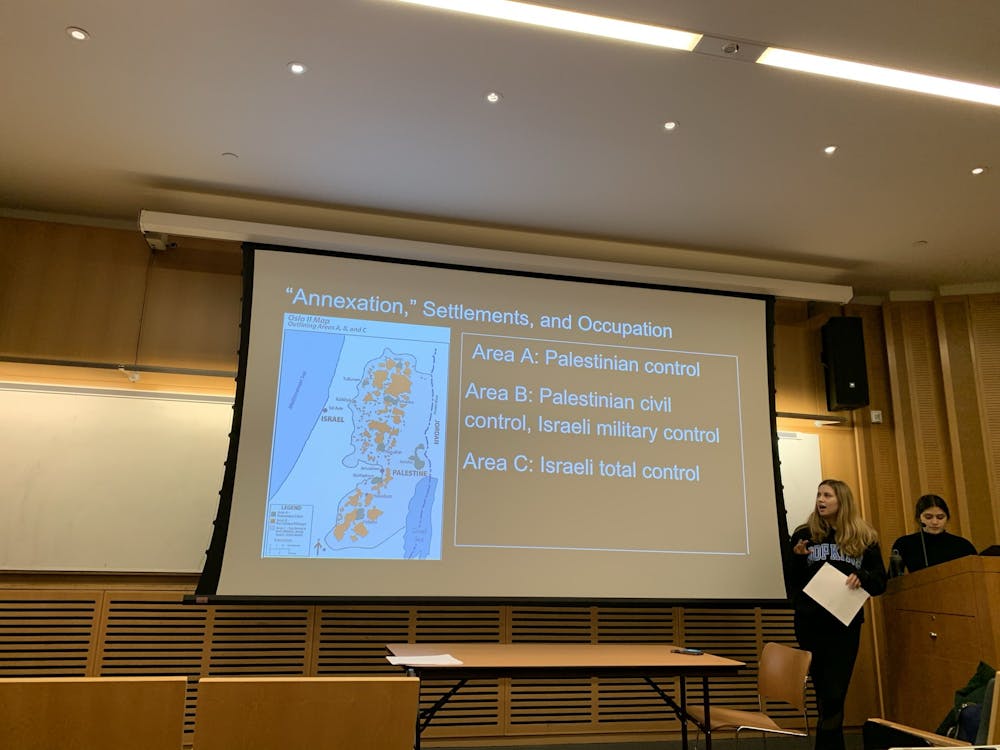The Hopkins chapter of J Street U co-hosted a discussion on U.S. President Donald Trump’s Israel/Palestine peace plan with Hopkins College Democrats (HopDems) on Wednesday night. J Street U is a grassroots organizing branch of J Street, an organization focused on achieving a two-state solution to the Israeli-Palestinian conflict.
The Trump administration’s proposed peace plan seeks to resolve the decades-long conflict between Israel and Palestine. Palestine currently exists as a series of non-contiguous cities and territories within the larger purview of Israeli security.
Emma Sokolow, sophomore and co-chair of J Street U, started the presentation by stating J Street U’s opinion on the Trump administration’s plan.
“It’s a Trump peace sham,” she said.
Senior Emily Sklar, co-chair of J Street U, described the current geopolitical context surrounding Israeli-Palestinian relations. She explained that in 1995, the Oslo Accords divided the West Bank into three areas. Area A is entirely under Palestinian control.
Area B is under Palestinian civil control but Israeli military control, and Area C is entirely under Israeli control.
Despite the fact that the Oslo Accords were intended to be a temporary settlement, the situation has not changed since 1995.
Evan Drukker-Schardl, senior and Southeast regional board member of J Street U, clarified the conditions of the occupation through a personal anecdote: He and a fellow traveller were allowed to pass from Palestinian to Israeli territories with an examination of their passports, but Palestinians were subject to extensive security checks, including questioning and detainment.
“This is what the occupation means,” he said. “It means precarity and the potential for violence and disruption of daily life for Palestinians.”
Sokolow explained that the Trump administration’s plan may render a two-state solution impossible as it favors Israel.
Drukker-Schardl ended the presentation by calling on the audience to continue to have discussions and educate each other about the topic, elect a pro-diplomacy administration in 2020 and work to change the Democratic National Committee’s platform on Israeli-Palestinian relations.
Sklar expanded on the presentation’s claim concerning what she sees as a flaw of the peace plan in an interview with The News-Letter.
“The peace plan is not a peace plan at all. It didn’t consult Palestinians, it was very one-sided and it completely endangered the future of a two-state solution by giving a green light for annexation,” she said.
Many, including Sokolow, agreed that the future of U.S. foreign relations with Israel and Palestine is contingent on the outcome of the upcoming 2020 election.
“I’d like to be optimistic that a lot of the Democratic candidates will have progressive views on Israel and Palestine,” she said in an interview with The News-Letter. “The Trump peace plan unfortunately demonstrates to us that the Trump administration, if it were to continue, would make dangerous changes to American foreign policy in Israel and Palestine.”
HopDems member and sophomore Mary Sulavik explained that current 2020 Democratic candidates, such as Elizabeth Warren, have criticized the Trump administration’s peace plan for its lack of input from the Palestinian side of the conflict.
Sylvana Schaffer, sophomore and co-president of HopDems, agreed with Sulavik, but acknowledged in an interview with The News-Letter that the U.S. may not have as much influence as some would want on the situation in Israel and Palestine.
“At this point there’s also not as much America can really do. It’s kind of what’s happening on the ground in Israel. It’s just kind of moving in one direction and there’s not much we can do to influence it, as much as we might want to,” she said.
Sokolow pointed toward mobilizing other campus groups to enact change and remains optimistic about a working relationship with HopDems in the future.
“Our relationship with HopDems on campus is really valuable,” she said. “Hopefully, if we can show HopDems that this is an issue that we care passionately about, that we think they’d be interested in, then we can work on a long term partnership.”
Sklar pointed toward a general trend within fellow students and members of her generation. Although she hopes that individuals will remain critical, she believes they will ultimately work to better the lives of both parties in the Israeli-Palestinian conflict.
“Our generation, which is much more progressive on the issue, is going to change that relationship so that we can criticize Israel and criticize the issue while still being pro-Israel and supporting the future of a Jewish democratic state,” she said.





